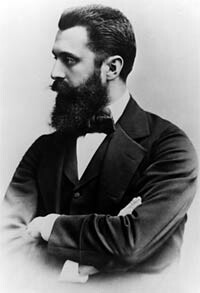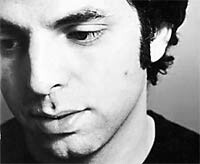The Electronic Intifada 31 May 2005

Theodor Herzl
Now, however, as the walls and outposts of the Zionist enterprise are becoming ever more conspicuous, so too are the contradictions inherent in the 57-year-old experiment of establishing a state that is both “Jewish” and “democratic” in pluralistic Palestine. The recent, albeit short-lived, decision of Britain’s Association of University Teachers (AUT) to impose an academic boycott on Bar-Ilan and Haifa Universities attests to the growing realization abroad that Israel’s policies adversely affect Palestinians on both sides of the Green Line.
The AUT’s decision, which was taken on 22 April 2005, and then, following enormous pressure, revoked at a special council meeting on 26 May 2005, was made in response to the call from the Palestinian Campaign for the Academic and Cultural Boycott of Israel (PACBI). PACBI called for the implementation of a boycott in protest against the Israeli academy’s contribution to the maintenance of the state’s policies toward Palestinians; most notably, the continuing “military occupation and colonization of the West Bank and Gaza,” and “the entrenched system of racial discrimination and segregation against the Palestinian citizens of Israel.”
In the ultimately successful counter-campaign waged in the English language press against the boycott, most arguments focused on the affront to the principles of academic freedom that such a boycott was said to constitute. Beyond these arguments, however, a more subtle defense-strategy emerged. Of the two claims made by PACBI cited above, it is the second that provoked the sharpest rebuttals from Israel’s domestic intelligentsia and its loyal supporters abroad. The occupation is only denied by a few right-wingers, but it is the liberals in Israel who take exception to accusations of domestic state-sponsored ethnic discrimination and segregation. Moreover, the notion that Israeli academia could be tainted with such illiberal practices is anathema to Israel’s self-promotion as a mature democracy.

Etgar Keret
This picture is, of course, a distortion. Notable by their absence in these avowals of the political, “racial” and religious tolerance said to reign in the campuses of Israeli universities were the voices with the greatest credibility: those of Palestinian students and scholars themselves. The result is the commentary equivalent of one hand clapping.
There are good reasons why Palestinians at Israeli universities have not been heard applauding the tolerance and liberalism of these institutions. For a start, there aren’t many of them. Although Palestinian citizens of Israel comprise approximately 20% of the population in Israel, according to official data, “non-Jews” comprise 9.5 percent of undergraduates, 4.8 percent of students in Masters’ programs, and 3.2 percent of students in doctoral degree programs. Moreover, as the civic-equality group Sikkuy has acknowledged, a “non-Jewish” applicant is three times more likely to be rejected from university than a Jewish candidate. As for the number of Palestinian academic staff in Israeli universities, at the last count that figure was found to be a paltry one percent.
More disturbing still is the reluctance to improve accessibility for aspiring Arab students. When, in 2003, the psychometric examination requirement known to be the principle barrier to entry for Palestinians was dropped, Palestinian university applicants benefited in significant numbers. In direct consequence, the decision was over-turned and the requirement reinstated.
But the discrimination against Palestinians in Israel’s higher education system does not end there, as the experience of Arab students at Haifa University exemplifies. Two weeks ago, the university administration attended a court hearing in which it defended its decision to refuse to place a Christmas tree in the university’s Main Building during the Christmas period, despite repeated requests from the Arab Students’ Committee, and despite the fact that a Jewish menorah is placed there during the celebration of Hannukah. The administration preferred to ghettoize Christmas in another building, far from the center of campus.

Yossi Ben Artzi
In addition, the proliferation of indictments filed against successive leaders of the Arab Students’ Committee testifies to the harassment that Palestinian students expressing dissenting views on campus can expect to attract from the university’s administration.
All of this occurs at an institution described by its President, Aaron Ben Ze’ev, to an Independent journalist as, “the most pluralistic and most tolerant university in Israel.”
Which brings us to our last point. For the past five years, the CHE has ostensibly been considering the establishment of a new, Arab, institute of higher education in the Galilee, where a clear majority of the population is Palestinian. But, since Likud MK Limor Livnat assumed the post of Education Minister, the plan has been shelved. In response to renewed calls from the Arab community for its implementation, MK Livnat explained that the plan had been rejected because the concept of an Arab university is “racist.” Instead, a decision was made by the cabinet to recommend the transformation of several Galilee colleges and the College of Judea and Samaria, situated in the illegal Jewish settlement of Ariel in the occupied West Bank, into two new Israeli universities.
Like its counterparts across the Green Line, the College of Judea and Samaria boasts of its commitment to pluralism and ethnic tolerance. On its English website the college proudly advertises that its students represent, “the full spectrum of Israeli society: secular and observant, new immigrant and veteran Israeli, Jew and Arab.”
After all, in an outpost of civilization, discrimination is considered an affront to academic freedom.
Sharif Hamadeh is a Human Rights Advocacy and Development Fellow with Adalah – The Legal Center for Arab Minority Rights in Israel. This commentary first appeared in Adalah’s Newsletter, Volume 13, May 2005. For more information, see www.adalah.org/eng/
Related Links




